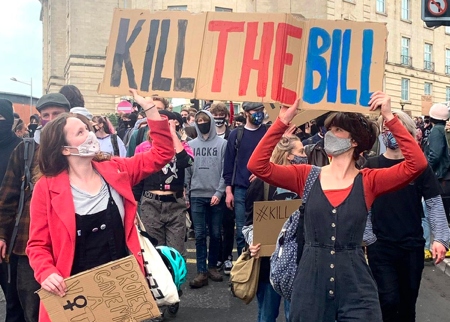Protests against the government’s widely rebuked legislation that would quash the right to protest, go marching on in Bristol, writes Aaliyah Miller.

Aaliyah Miller is a freelance writer and Politics and International Relations student based in Bristol
March 21, 2021 saw the city of Bristol erupt in protest, triggered by opposition to the government’s proposed Police, Crime, Sentencing and Courts Bill.
This was not an isolated event. The city has now hosted nine consecutive rallies, all of which were in response to the government’s bill, testimony that the people of Bristol are committed to persistent shows of preserving democracy.
Bristol’s protests have gained national attention, not only sparking conversation about the government’s bill – but also because of the handling of protestors by the police.
No plans for demonstrations to ease in Bristol
Protest attendees voiced concern about police conduct and the media has even reported force used against journalists that were in attendance. This conflict has appeared to fuel the city’s anger and a conversation with a demonstrator confirms there are no plans for demonstrations to cease.
James, a protestor, has attended “all but three protests” and refers to them as “a big soup of police brutality”, which protestors like James find hard to differentiate between. Each protest has displayed different methods of activism – from marches to speeches – but all are said to have shown “intensity and the passion”. The protestors determine that it is for “the people” to decide the future of the movement but confirm “passion” will persist.
James pinpoints intersectionality as a central focus moving forward. “Unions, climate activists, pride attendees, this bill threatens us all, we must fight it as a collective,” James said.
The criticism felt by Bristol’s law enforcement has also been directed towards the city’s mayor, who sits as a Labour representative. Citizens and protesters alike voiced concern online in response to Mayor Marvin Rees’ Facebook statement concerning the recent events.
Police brutality is a catalyst for concern
Rees declared, “the actions of some of these protestors are politically illiterate and strategically inept.” The comments evoked anger from some who accused the mayor of failing to condemn police brutality. For many, the actions of Avon and Somerset police appear to have overtaken the controversial bill as a catalyst for their concerns.
Another commenter believes, “if elected officials led from the front and called out this bill for what it really is, we wouldn’t need to protest so much.” These beliefs support those of James, that, “those in power are sat on their thumbs, whilst abuses of power come to fruition”.
James’ views are representative of much of the anger felt by many of the campaigners in Bristol. A disconnect has been unveiled between the people and their parliamentary representatives and it appears the unrest will not cease until this disconnect is bridged.
These protests have created a movement in Bristol and whilst the most prominent impact appears to be the disruption that continues to shake the city, the underlying shift that has taken place for many cannot be ignored.
Prior to the ‘Kill the Bill’ movement, many saw police as friends and neighborhood heroes – views that have been altered by recent actions that have shocked social media and beyond. Responses to the mayor’s statement reveal that some are even reconsidering where they plan to cast their future votes.
Surge in social media activity to promote Bristol protests
Instagram pages, including ‘Bristol Resists’ and ‘Kill the bill Southwest’, have been created to promote information about the movement going forward. A community of thousands of online users have showered such social media campaigns with support.
The online movement consists, not only of protest footage and information, but of artwork, memes and helpful resources that can help to ‘kill the bill’. There is also a website that contains everything one would need to know, from a breakdown of the movements motivations to pointers as to how to help.
The site encourages people to write to their MP’s councillors or police crime commissioners to state their opposition to the bill.
Additionally, the Joint Committee of Human Rights is calling for evidence regarding the bill, which investigates whether a number of its proposals interfere with rights guaranteed through the Human Rights Act 1998 (HRA) and Articles of the European Convention on Human Rights.
The public are encouraged to submit evidence that may correlate this. This can be fundamental in enacting change, as following the second reading on March 16, the bill has been sent to a public committee, which will scrutinise the bill thoroughly – reporting back to parliament on June 24.
Bristol’s protests are marching on
Protests are still marching on, with Bristol’s next rally taking place on May 1 at 12pm in the city’s ‘Castle Park’.
However, this current political movement is not confined to physical protest. Change has occurred in the mindsets of many.
‘Kill the Bill’ protests may be spoken of for the radical arson of police vans and continuous marches by determined groups. However, the ideological shift that has taken place is all but guaranteed to exist as a legacy of the movement. Whilst the number of those who gather on the streets may waver, those who have felt disappointed by their representatives or victimised by the police will hold these feelings – regardless of what takes place on the ground.
The future of the movement for some consists of belligerent marches and passionate speeches. But for many, it simply exists as an unchangeably altered perspective on the system that governs them.
To reach hundreds of thousands of new readers we need to grow our donor base substantially.
That's why in 2024, we are seeking to generate 150 additional regular donors to support Left Foot Forward's work.
We still need another 117 people to donate to hit the target. You can help. Donate today.



